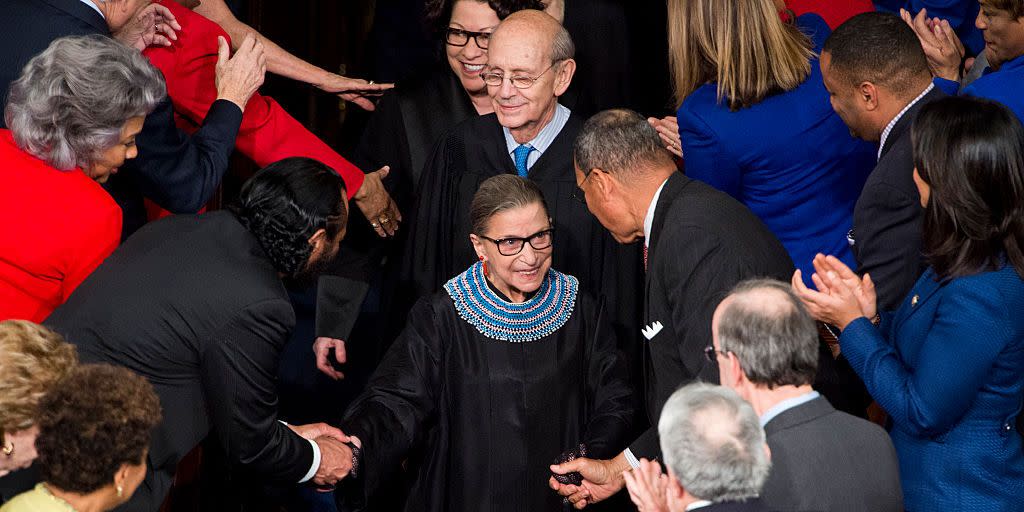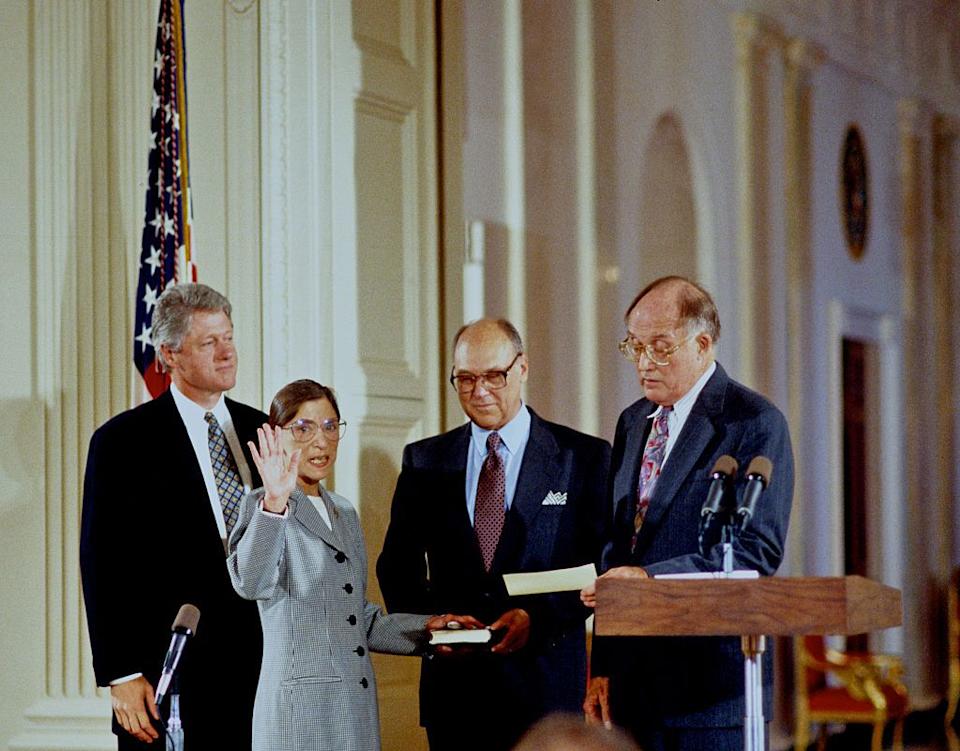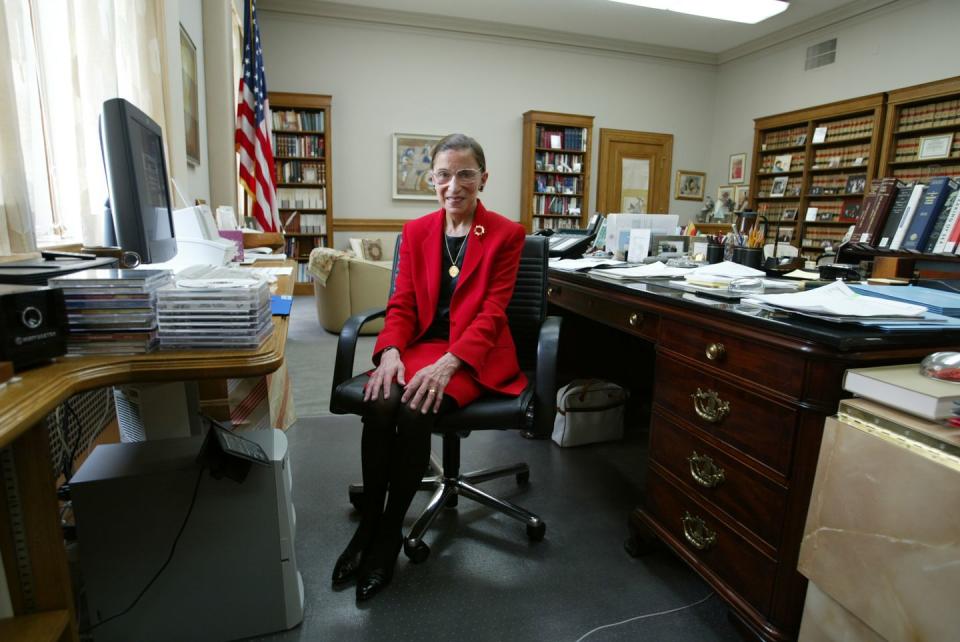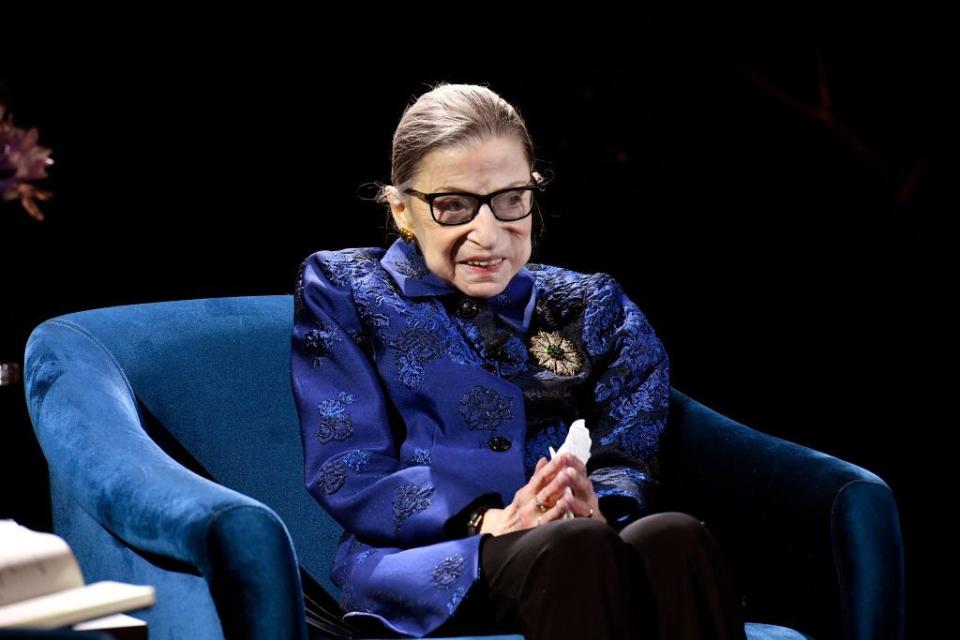The Great Dissenter: The Judicial Legacy of Ruth Bader Ginsburg

On Friday evening, just after the Jewish New Year and before anyone could bear it, Supreme Court Justice Ruth Bader Ginsburg died at the age of 87 from metastatic pancreatic cancer. She leaves a big hole in the country and an open seat that filling will tear Washington apart.
Her legion of admirers began streaming in the hundreds to the Supreme Court Building late into the night to remember her with flowers, bearing and wearing more R.B.G. merch than groupies at a rock concert. On Ginsberg’s 86th birthday, a year earlier, many flocked to the steps of state courthouses around the country, dropped and did twenty of her signature push-ups, homage from a younger generation to a feminist icon from an earlier one for changing their lives.
There is only one problem with all the fuss: the notorious RBG wasn’t a feminist, at least not enough of one for some women’s groups to support her when President Bill Clinton nominated her to fill Byron White’s seat in 1998. She was considered far too conservative and an incrementalist, someone who’d let too many doors be slammed in her face without ever raising her voice or burning a bra. The reaction so disturbed her husband, the affable and renowned tax attorney Marty Ginsberg, that he went to work behind the scenes to convince the bar and the Senate otherwise. With a stack of groundbreaking lawsuits to her credit, it wasn’t hard. She won confirmation 96 to 3.
Her ascension to the court added to the lore of a marriage she described as the decision that made the life she led possible. Marty wasn’t a footnote to her career but half of a partnership so profound, it was the centerpiece of the 2018 biopic, On the Basis of Sex (the documentary RBG was nominated for two Academy Awards the same year). It was a love story that showed a woman can have it all, just not all at the same time.
The Pioneer from Flatbush
Ruth Bader was a precocious only child who twirled a baton at her Brooklyn high school when she didn’t have her nose in a book. At Cornell, she met the only man who loved her for her brain and married him after deciding they would be lawyers together. But before they got to Harvard Law, Marty was called up to active duty at Fort Sill, where she got her first taste of the sexism that would define her career. When she told her superiors she was pregnant, they decided suddenly that she was no longer up to the job.

When the couple returned to Cambridge, they were in for another surprise. Marty was felled by a rare form of testicular cancer and she had to take classes, notes, and type papers for both of them, while juggling their infant daughter. One of nine women enrolled who the dean called out for taking up a man’s spot, Ginsburg gave up that spot when Marty recovered, graduated, and landed a prestigious job in New York. She finished her degree at Columbia at the top of her class, the only student to serve on law review at two schools. Then, she encountered another round of discrimination.
While her male counterparts landed the federal court clerkships that propel a career skyward, one judge rejected her because he wouldn’t be able to tell dirty jokes in chambers, another because she might wear pants. She quietly settled for a job in a lower court, then a research project on gender in Stockholm—where she learned Swedish and wrote a book on wrote a book on Swedish civil law—then turned to teaching, one of the few career open to women at the time, at Rutgers, where she taught the first course on women and the law, when there wasn’t much of either.
Although she was the first female to win tenure, when she found out she earned less than her male colleagues and that she was pregnant a second time, a surprise given Marty’s cancer, she kept it secret as long as she could.

Her climb to the Supreme Court began when she returned to work, after her son James was born, at the Women’s Right Project of the ACLU in the early seventies. When Betty Friedan was writing about “the problem with no name,” Ginsburg named it, briefed it, and argued it in six landmark cases before the Supreme Court; she won five. She never used the word “sex”—too distracting for male judges—instead using “gender.” By the end, she had wiped over 200 discriminatory laws off the books: A woman could cut a man’s hair, buy a drink at the same age, administer an estate, and serve on a jury. A male widower could collect the same Social Security benefits as a woman and a woman could claim the same military housing allowance as a man.
The Great Dissenter
Once on the Supreme Court, she wrote majority opinions in the most significant rulings of our time. Over 50 years, as litigant and judge, Ginsburg became to women what Thurgood Marshall was to Blacks. She extended equal rights to the LBGTQ community, the mentally ill, immigrants, women who wanted to be cadets at Virginia Military Institute and ones who wanted a safe abortion. And when the court shifted right, she shifted with it, becoming the great dissenter.
When she took to reading her minority opinions out loud, she came to the attention of a law student at New York University who uploaded them to Tumblr, launching a new chapter in Ginsberg’s quiet life as an intellectual Kardashian. In addition to the biopic and an Emmy-winning documentary, Ginsburns thrown out by Kate McKinnon on Saturday Night Live, and a spate of “You Bader Believe It” mugs, children’s books, and a best-selling memoir.

The shy, modest, jurist so soft-spoken you had to lean in to hear her, wore her unsought celebrity well, telling her grandchildren when she was mobbed by selfie-seekers it was a chance to encourage another generation to fight the good fight before laughing at herself and tossing surplus “Fragile as a Bomb” t-shirts at them.
Her unexpected late in life popularity came after the sudden death in 2016 of Justice Antonin Scalia, her opera buddy, her closest court friend whose jokes she laughed at and whose hunting bounty she tolerated when he brought his kill over for Marty to roast at their classic New Year’s feasts. With his seat open, the Republicans controlled the Senate, against all precedent, refusing to hold hearings on Barack Obama’s nominee, Merrick Garland. Majority Leader Mitch McConnell held the seat open for an unprecedented ten months so that a new president, who turned out to be Donald Trump, could nominate Neil Gorsuch. In a stunning bit of hypocrisy, McConnell announced after a plea Ginsberg, as she lay dying, gave to her granddaughter that wished not to be replaced before the election, that he would bring Trump's nominee to a vote on the Senate floor.
Ginsburg held on as long as she could, as wicked smart as ever, writing her share of opinions in the 2019 session, giving speeches, collecting awards, immersed in her grandchildren’s lives, and all without giving up the opera (or her pushups).

The last time I saw Ginsberg was at a book party for the wife of one of the justices. I sat down next to her on the pretense of handing her a glass of wine off a passing tray. She accepted it, did a good job pretending she remembered me, as she did unfailingly with everyone who came up to her, by then, used to being the center of attention of any room she entered. At the opening concert at the Kennedy Center last fall, a spontaneous ovation went on so long as she took her place in the balcony, you’d think the audience had come to see her and only incidentally to hear the National Symphony play Shostakovich.
Ginsberg leaves behind an unparalleled body of work, a daughter who followed in her footsteps, a son who presides over a classical music recording business, four grandchildren and several generations of women who wouldn’t be where they are without her.
You Might Also Like

